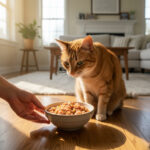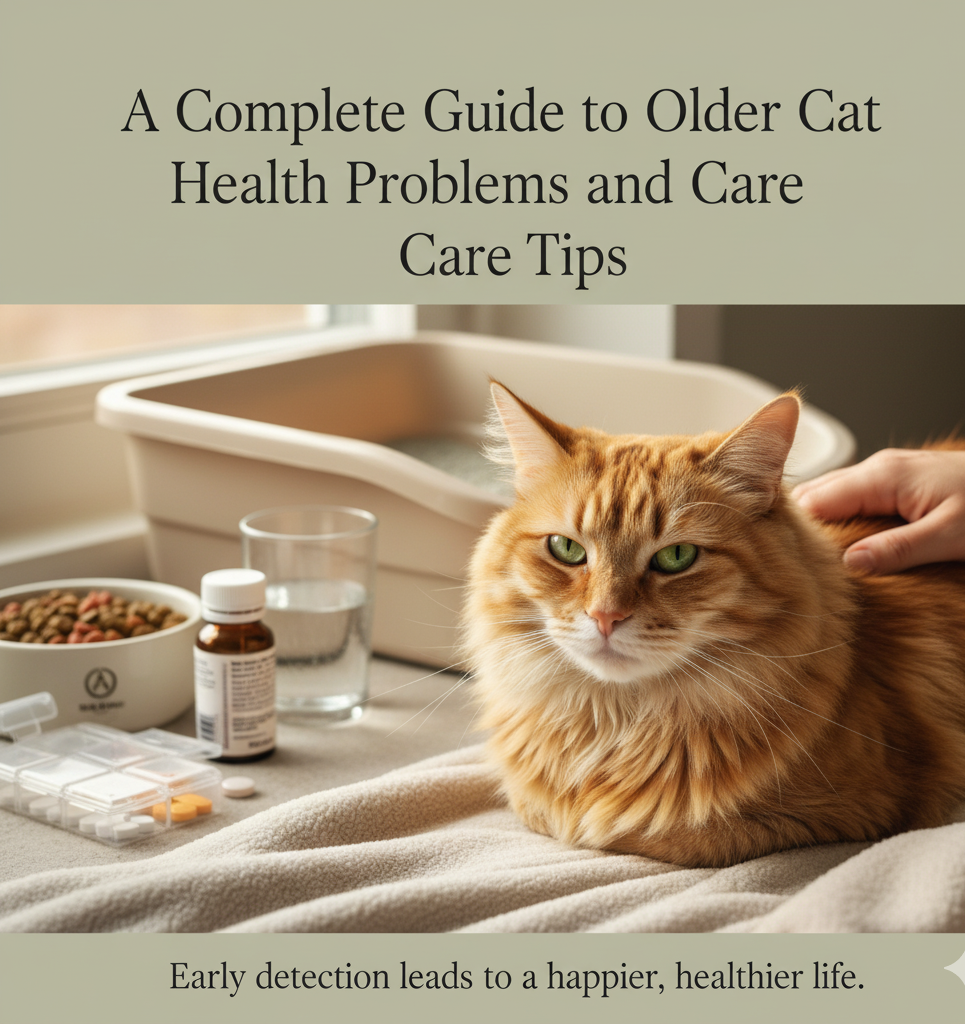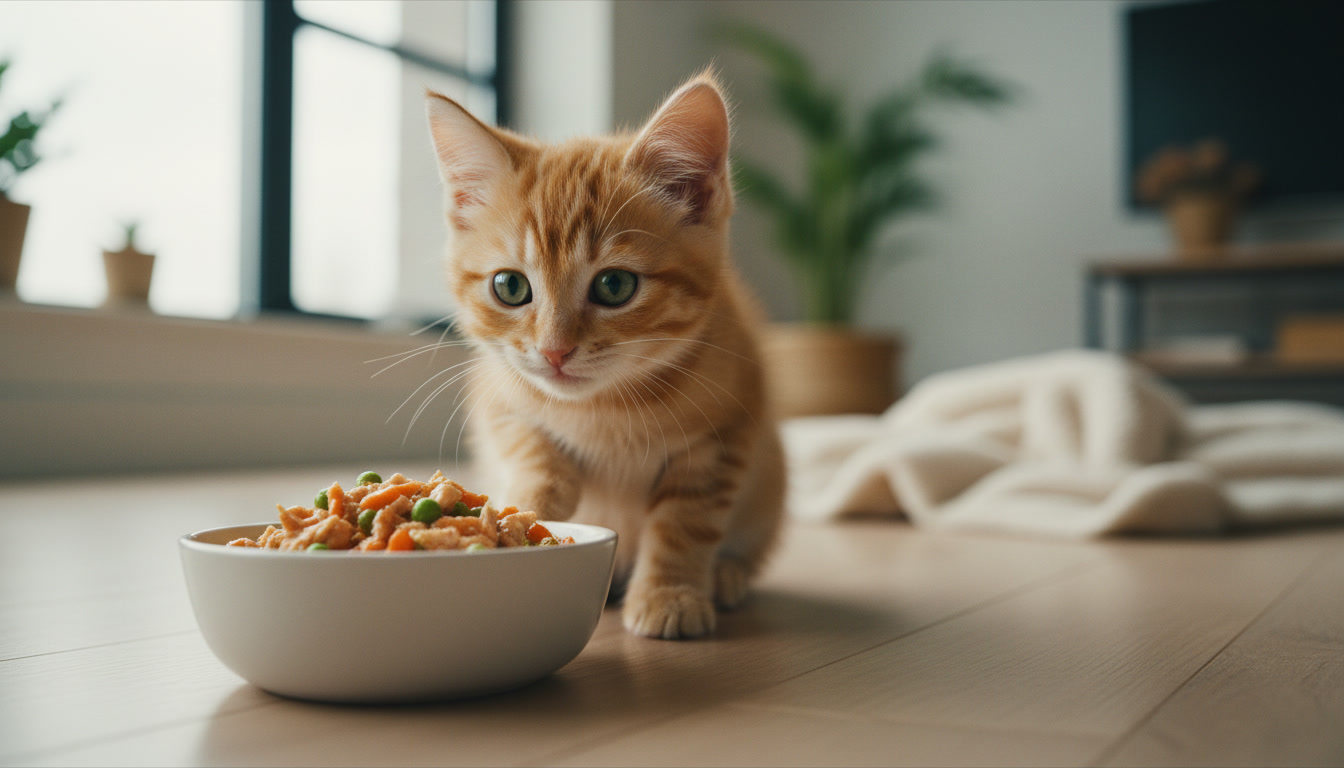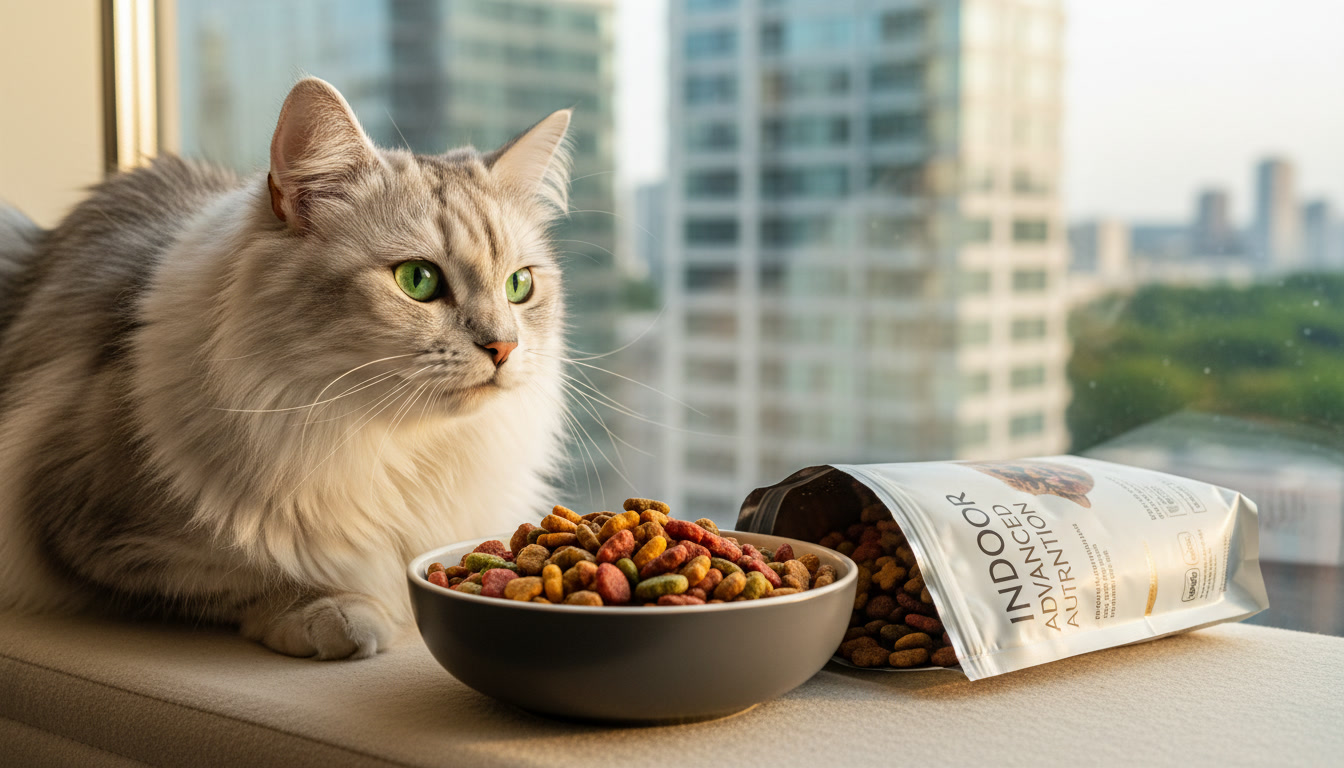As your cherished feline companion enters their senior years (typically age 11 and up), their health needs change significantly. Just like humans, aging brings a higher risk of certain medical conditions. Recognizing the early signs of common older cat health problems is crucial for early detection and successful management, ensuring your cat enjoys their golden years with comfort and quality of life.
The Most Common Older Cat Health Problems
The shift in a cat’s metabolism and body function with age makes them susceptible to a range of issues, many of which can be subtle at first. Regular veterinary check-ups—ideally twice a year for senior cats—are essential for catching these conditions early.
1. Kidney Disease and Urinary Tract Issues (2.5% density)
Chronic Kidney Disease (CKD) is one of the most prevalent and serious older cat health problems. The kidneys gradually become less efficient at filtering waste from the blood.
- Symptoms to watch for: Increased thirst (polydipsia) and frequent, large amounts of urination (polyuria), weight loss, decreased appetite, and lethargy.
- Management: While CKD is not curable, it is manageable with therapeutic diets, increased hydration (e.g., fluid therapy), and medications. Early detection significantly improves prognosis.
2. Hyperthyroidism (Overactive Thyroid)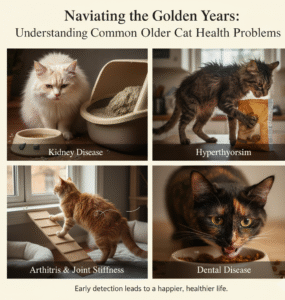
This condition involves the thyroid glands producing excessive amounts of thyroid hormone, essentially putting a cat’s metabolism into overdrive.
- Symptoms to watch for: Significant weight loss despite a ravenous appetite, hyperactivity, excessive vocalization, increased thirst, and poor coat condition.
- Complications: Left untreated, hyperthyroidism can lead to other serious older cat health problems, notably heart disease and high blood pressure (hypertension).
3. Arthritis and Joint Stiffness
Degenerative Joint Disease, or arthritis, is extremely common, affecting over of cats over the age of 12. Cats are masters at hiding pain, so the signs can be subtle.
- Signs of reduced mobility: Hesitation to jump up or down, difficulty using the litter box (especially high-sided ones), decreased grooming (leading to a matted coat), and sleeping more.
- Care: Environmental modifications like ramps, steps to favorite perches, soft bedding, and veterinarian-prescribed pain management and joint supplements can greatly enhance comfort.
Managing Mobility and Pain in Older Cat Health Problems
Arthritis-related discomfort can drastically reduce a cat’s quality of life. Recognizing reluctance to move as a sign of pain, rather than just “slowing down,” is a key part of senior cat care.
4. Dental Disease
Dental issues like Periodontal Disease, gum infections, and painful tooth resorption are among the most overlooked older cat health problems.
- Signs to watch for: Bad breath (halitosis), drooling, reluctance to eat (or approaching the bowl then walking away), pawing at the mouth, and visible tartar or red, inflamed gums.
- Impact: Untreated dental infections can release bacteria into the bloodstream, impacting vital organs like the heart and kidneys. Regular professional dental cleanings are often necessary.
5. Weight Changes: Obesity and Sudden Loss
Both obesity and unexplained weight loss are critical indicators of underlying older cat health problems.
- Obesity: Increases the risk of conditions like diabetes and arthritis. It usually results from decreased activity combined with a consistent diet.
- Sudden Weight Loss: A common symptom of several serious conditions, including hyperthyroidism, kidney disease, diabetes, and cancer. Any unmanaged weight loss, even with a good appetite, requires immediate veterinary investigation.
Addressing Serious and Cognitive Older Cat Health Problems
Endocrine and Organ-Related Older Cat Health Problems
Other serious, systemic conditions require careful monitoring and management in the senior years:
- Diabetes: More common in overweight senior cats. Symptoms mirror those of kidney disease: increased thirst and urination, along with weight loss despite a good appetite. Management typically involves dietary changes and insulin injections.
- Heart Disease and High Blood Pressure: Conditions like Hypertrophic Cardiomyopathy (HCM) become more prevalent. Hypertension is often a secondary problem caused by Hyperthyroidism or CKD, and can lead to sudden blindness or stroke-like symptoms.
- Cancer: The risk of various cancers, such as lymphoma, increases with age. Look for non-healing sores, abnormal lumps or bumps, weight loss, or persistent digestive issues.
Cognitive and Sensory Decline
- Cognitive Dysfunction (Cat Dementia): Symptoms include disorientation, excessive night-time vocalization, changes in sleep/wake cycles, house soiling outside the litter box, and altered social interaction. Environmental familiarity and enrichment can help.
- Loss of Vision or Hearing: While not typically painful, vision or hearing loss requires owners to be mindful of scaring their cat and ensuring the home environment is safe and consistent.
Frequently Asked Questions (FAQs)
What are the earliest signs of older cat health problems?
The earliest signs are often subtle changes in routine, such as increased water drinking, urinating more frequently (bigger clumps in the litter box), a decrease in grooming habits, reluctance to jump onto furniture, or increased vocalization, particularly at night. Any change in appetite, up or down, warrants a check-up.
How often should a senior cat see the vet?
For cats aged 11 and older, it is highly recommended to schedule a check-up every six months. Since cats age faster than humans and tend to hide illness, this frequency allows for the early detection of common older cat health problems like kidney disease or hyperthyroidism, when they are most manageable.
Can old age confusion (dementia) be treated?
While there is no cure for Feline Cognitive Dysfunction, it can be managed. Strategies include keeping the home environment consistent, sticking to a strict daily routine, using nightlights to prevent disorientation, and discussing certain prescription diets or supplements with your veterinarian.
Does weight loss in an older cat always mean a serious disease?
In most cases, yes. While some weight loss can be attributed to muscle mass decline, unexplained or sudden weight loss, especially when accompanied by a good or even increased appetite, is a classic sign of hyperthyroidism or diabetes. If the appetite is decreased, it could indicate kidney disease, cancer, or severe dental pain. Always consult your vet about weight changes.






